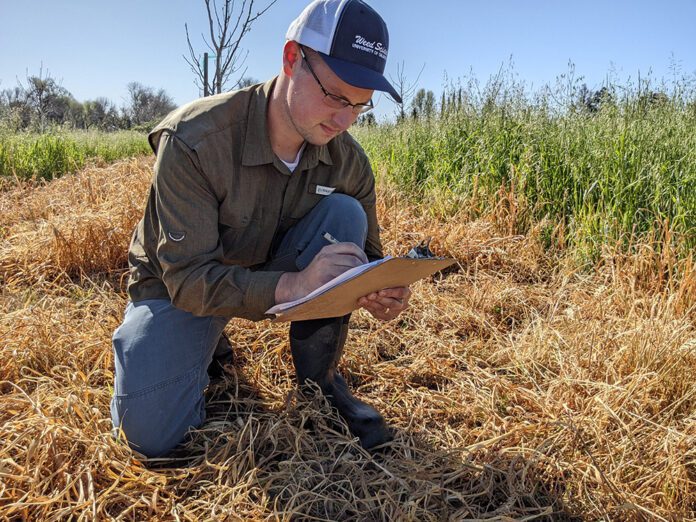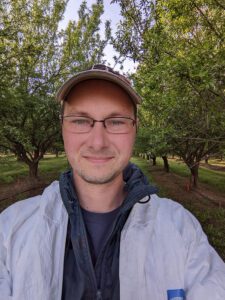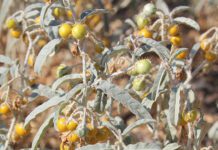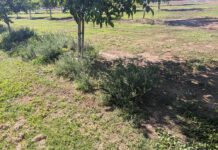
Ryan Hill knew he wanted to work with growers and ranchers from a fairly young age. One of the UCCE’s newest farm advisors, Hill got a taste in his youth for what that line of work might look like, travelling around the San Joaquin Valley with his dad, who worked in the processing tomato industry.
“I got to see him out in the field, meeting with growers and conducting variety trials. I was able to see how interdisciplinary agriculture is,” he said.
Hill, who serves as the extension weed science and agronomy advisor for Tehama, Shasta and Glenn counties, said the opportunity to tag along with his dad also helped him realize later he wanted to pursue a career in agricultural research, an interest that would take him through college and beyond.
He attended George Fox University in Newberg, Ore. and spent a summer working for Extension Specialist Chal Landgren at Oregon State University’s (OSU) North Willamette Research and Extension Center. He earned a bachelor’s in biology from George Fox University in 2014.
“It was a really interesting time attending George Fox and working as an extension intern. I was able to explore plant pathology, entomology, plant breeding and ecology as I developed an idea of what I wanted to pursue a career in,” he said.
Finding His Path
Following graduation from George Fox with his bachelor’s, Hill moved back to California and landed a job at Lawrence Berkeley National Laboratory in Berkeley, Calif. The functional genomics lab needed someone to bulk seed stocks for their transgenic plants, specifically Brachypodium distachyon, which they used as a genetic model to study the genomes of grass species, he explained.
“They needed someone to grow ~23,000 lines of this species they had modified, so they hired me. For someone newly graduated with a bachelor’s degree, it was an incredible privilege to bump elbows with some world-class geneticists,” Hill said.
His time with the Berkeley lab gave him time to think about what he wanted to do for graduate school, and after his appointment with the lab ended, Hill found himself back in Oregon to begin his master’s studies in plant breeding and genetics at OSU. He joined Dr. Shawn Mehlenbacher’s hazelnut breeding lab where he studied the genetic basis for self-incompatibility in hazelnut and worked as a member of the hazelnut breeding team.
Upon graduation with his master’s in March 2020, he joined the perennial weed science lab at OSU. There, he ran lab and greenhouse operations and managed trials at the research farm on crops like hazelnuts, cranberries, hops, blueberries and Christmas trees.
“It was a big change in focus for my career, but I believe it was the best professional decision I’ve ever made,” Hill said.
He spent the next three and a half years working at the lab with Dr. Marcelo Moretti, an assistant professor in weed science and perennial horticultural crops, immediately finding a mentor in him.
“It was such a joy to be a member of that lab and work with Marcelo; he’s an exceptional weed scientist with a really great team.” Hill said.
The experience allowed him to lead students, conduct research, publish articles and present results to stakeholders. While he was hesitant about pursuing weed science at first, coming from a plant genetics background, it was a better experience than he could have imagined, thanks in large part to working with Moretti.
“The discipline you work on, it matters, but having the right person to work under and learn from matters a whole lot more,” he said.
Hill said his time in the weed science lab provided him with the skills and ideas he’s now able to use in his new role with UCCE.
Addressing the Needs of Growers
What excites Hill the most about his new extension role is the opportunity to address what growers are dealing with on a direct level. He said that while his prior role in weed science was also extension-focused, most of his time had been spent on research operations.
“Now I get to take the role of meeting with growers, hearing their concerns and trying to collaboratively identify solutions,” he said.
says grower concerns in his area are really boiling down to high input costs and too little return on investment. That’s a difficult problem to solve and one he said brings on a host of other, smaller problems, like how to maintain an effective weed management program while cutting costs at the same time.

“Narrow margins mean sometimes there isn’t much left over for weed management,” Hill said. “Part of my job now is to find the most effective solutions for the lowest cost while still addressing complex issues like herbicide resistance management and crop safety.”
He’s also heard concerns from growers about herbicide-induced trunk injury, something he had a chance to work on in hazelnuts while in Oregon. He will now be able to focus on those issues in walnuts, almonds and prunes, following up on previous work done in Glenn County by former orchard systems advisor Dr. Dani Lightle, he explained.
“She’s no longer there, but I’ll be carrying on the project to investigate how trunk injury is induced and what you can do to protect your trees from herbicide injury,” he said.
Other areas he hopes to work on in his advisor role include weed management for agronomic crops, forage crop production and cover cropping.
“I’m not as familiar with the agronomy aspect of my position, but I am determined to make as much of a positive impact as I can,” he said.
He’s already started research projects on weed control in small grains and alternative forage crops and said he’s continuing to lean into his strengths.
“It’s going to take some time for the agronomy side to be a strength, but I intend for it to be,” he said. “I spent the last three and a half years focusing on one area, and maybe three years from now I’m going to be a passable expert on agronomic crops. I’d like to see that.”
Hill practices a biblical philosophy when it comes to serving the growers in his area. A passionate Christian, he says he filters everything he does through what scripture says about people and the world we live in, that every person is a reflection of God.
Hill will also be starting the UCCE Master Gardener program in Tehama County soon, a door he sees opening to have more contact with the general public in addition to the growers he serves.
He lives in Tehama County with his wife and three children.

Kristin Platts | Digital Content Editor and Social Correspondence
Kristin Platts is a multimedia journalist and digital content writer with a B.A. in Creative Media from California State University, Stanislaus. She produces stories on California agriculture through video, podcasts, and digital articles, and provides in-depth reporting on tree nuts, pest management, and crop production for West Coast Nut magazine. Based in Modesto, California, Kristin is passionate about sharing field-driven insights and connecting growers with trusted information.















